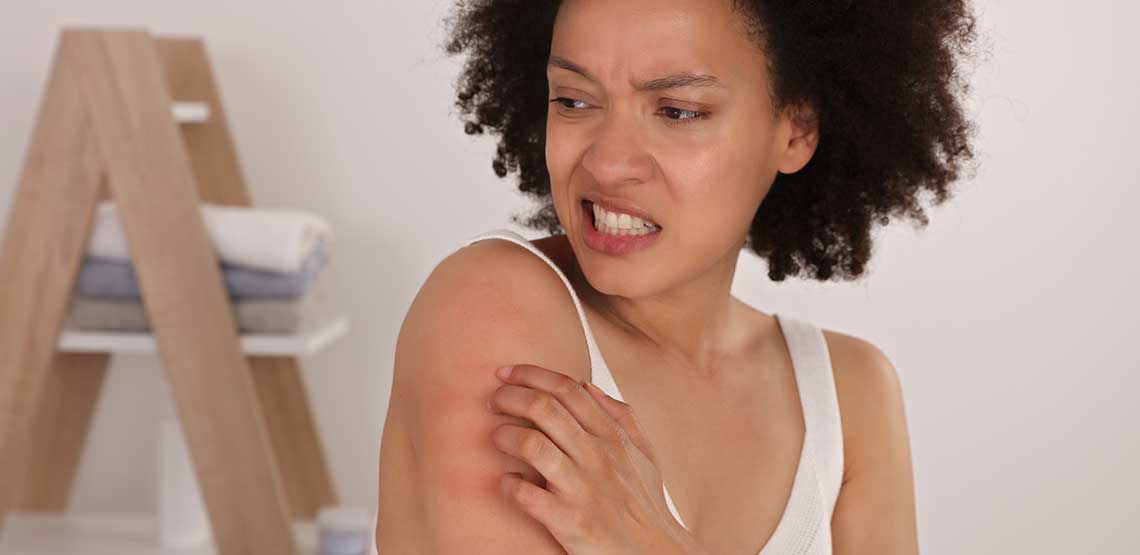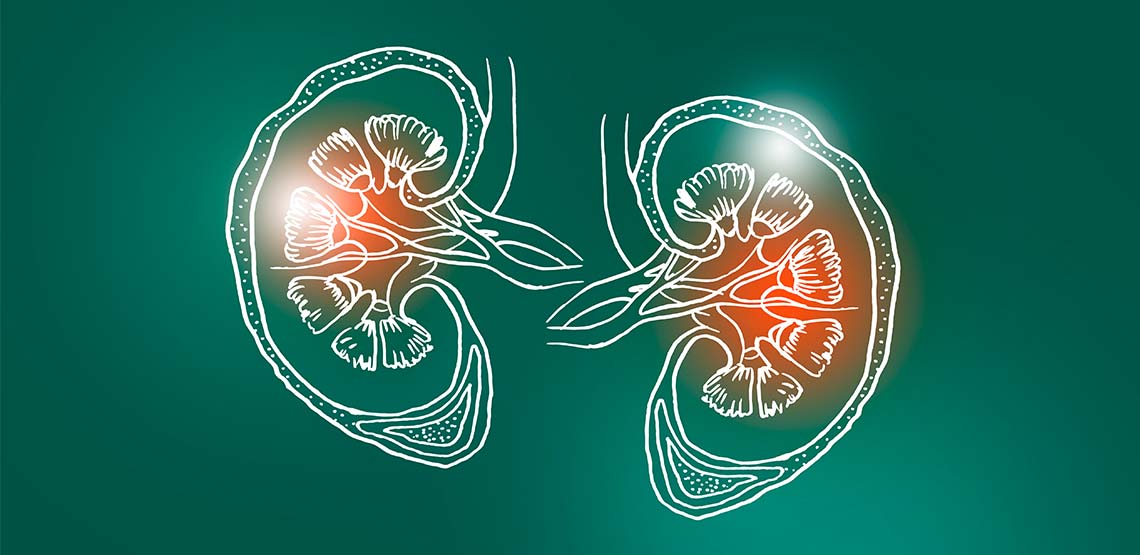What is the Difference Between Eczema and Psoriasis?
Eczema and psoriasis are both chronic skin conditions that can have a significant impact on a sufferer’s life and wellness.
Even though these conditions are chronic and may have severe symptoms, there are ways in which you can live and thrive when you suffer from them. But first, you should understand the difference between the two.
Eczema
Eczema is a skin condition that causes a red, itching, scaly rash. It’s more common in babies and young children (appearing before the age of 5), but can appear in adults of any age as well.
Long lasting and chronic, eczema “flares” at times, becoming much worse than it usually is. In children, the rash usually appears on the scalp, knees, elbows, and cheeks. In adults, it tends to be concentrated on the creases of ankles, wrists, knees, elbows, face (for example the eyelids), and neck. Eczema is not contagious.
Types of Eczema
There are different types of eczema, and some have specific appearances and require specific treatment. Always be sure to consult with your doctor when it comes to treatments and remedies.
The different types of eczema are:
- Atopic dermatitis: The most common form of eczema.
- Contact dermatitis: Caused by a reaction to specific substances.
- Dyshidrotic eczema: Causes small blisters to form and appear on your hands and feet.
- Hand eczema: Eczema that affects only the hands.
- Neurodermatitis: Similar to atopic dermatitis, and can appear on different places on your skin.
- Nummular eczema: Eczema that forms round, coin-shaped spots on your skin.
- Stasis dermatitis: Caused when weakened veins leak fluid into your skin.
Eczema Symptoms
There are various symptoms associated with eczema, but that is not to say that all the symptoms have to be present for eczema to be diagnosed.
Common eczema symptoms can include:
- Dry skin
- Itching (which may be more severe at night)
- Red to brown-grey patches of skin, as noted above
- Small, raised bumps — these may leak fluid and crust over if scratched
- Thickened skin that’s cracked and swollen
- Skin that is sensitive, swollen and even raw because of the scratching.
How to Treat Eczema
Although there is no cure for eczema, there are treatments available that will differ depending on the sufferer’s age and the severity of their eczema.
Most eczema can be treated at home and doesn’t need medical intervention other than over the counter medication to relieve the symptoms. Here are some steps you can take to treat eczema at home:
- Make note of what your triggers are so that you can avoid them. Triggers may include cleaning supplies, detergents, certain fabrics, and smoke.
- Have a daily bathing and moisturizing routine that will not only clean the skin, but also lock moisture in and soothe the affected skin. You can use creams that contain camphor to soothe the affected skin as well.
- Use any over the counter and/or prescription medication as prescribed. Topical medication, phototherapy, and immunosuppressants may be tried to relieve the eczema’s symptoms.
Don’t stop taking the medication because the eczema appears to be better without first consulting your health care practitioner.
Seeking Medical Attention for Eczema
You don’t necessarily have to see a health care practitioner for eczema symptoms. However, if you or your affected child experience any of the following symptoms, get medical help as soon as possible:
- The eczema is so uncomfortable that you can’t sleep, or it affects your daily activities negatively.
- You develop a skin infection; look for red streaks, pus, and yellow scabs.
- You continue to experience eczema symptoms regardless of using home remedies or over the counter medication.
If the rash looks infected and you or your affected child have developed a fever, you should seek medical attention immediately.
Seeing a doctor will also help you determine if what you're experiencing is in fact eczema, or another condition. Psoriasis and eczema can appear similar, so it's important to get a proper diagnosis.
Related Search Topics (Ads)
Psoriasis
Psoriasis is a chronic disease in which genetics and the immune system plays a significant part. This means that psoriasis can run in families.
Psoriasis typically affect the outside of the elbows, scalp or knees. However, it may appear on any part of the body. Like eczema these sites are also itchy, but psoriasis also burns and stings.
Doctors aren’t sure what causes psoriasis, but something usually causes the psoriasis to flare. This can have to do with genetics or the immune system. Certain skin cells starts to grow abnormally fast and this is what causes the psoriasis lesions to form.
Although psoriasis can develop at any age, it usually starts between the ages of 15 and 35. Psoriasis in infants is rare. Like eczema, psoriasis is not contagious.
Types of Psoriasis
There are seven different types of psoriasis, each one having it's own specific appearance. The seven types of psoriasis are:
- Plaque psoriasis: The most common form of psoriasis, it appears as red patches of skin that is raised and covered with a silvery white buildup of dead skin cells. Very itchy, they can often crack and bleed.
- Guttate: Usually starting in childhood, guttate shows up as small dot-like lesions.
- Inverse: This type of psoriasis shows up as red lesions in the folds of the body, for example under the arms.
- Pustular: Characterized by white blisters of non-infectious pus surrounded by red skin.
- Erythrodermic: Usually appearing in people with unstable plaque psoriasis, erythrodermic psoriasis is very severe and usually covers large parts of the body. Only 3 percent of psoriasis sufferers has this extreme form.
- Nail psoriasis: Psoriasis can also affect fingernails and toenails. The psoriasis causes pitting, abnormal growth, discoloration, and may even, in very severe cases, cause the nail to loosen and separate from the nail bed or crumble.
- Psoriatic arthritis: This condition is a combination of the swollen and sore joints of arthritis and psoriasis.
Psoriasis Symptoms
Common symptoms of psoriasis can include the following:
- Red patches of skin covered with thick, silvery “scales”
- Small scaling spots
- Dry and cracked skin that may or may not bleed
- Itching and burning of the affected areas
- Thickened, pitted or ridged finger or toenails
- Swollen and stiff joints
How to Treat Psoriasis
Various treatments for psoriasis are available to relieve or lessen the discomfort caused by the disease.
The most common treatments are:
- The use of cortisone cream or other ointments and lotions that may help to relieve the stiffness and the discomfort.
- The use of vitamin D creams, as this should reduce the rate at which the skin cells grow.
- Topical retinoids may also be used to help reduce the inflammation caused by the psoriasis.
- Light therapy is also an option in some psoriasis cases. This involves exposing the skin to UVA and UVB rays.
- Medication in the form of oral, injectable or intravenous medication may also be prescribed in moderate to severe cases.
Self Care to Relieve Psoriasis
Even though there is no cure for psoriasis, there are some steps that you can take that will complete your treatment plan. Psoriasis, with the correct treatment, may go into remission and significant healing is possible.
Steps to take at home to manage psoriasis are:
- Reducing stress through practicing relaxation techniques
- Moisturizing your skin
- Quitting smoking if you are a smoker
- Avoiding products that may irritate your skin with fragrances, etc.
- Wearing comfortable clothing that doesn’t rub against the psoriasis
- Following a healthy, balanced diet
Seeking Medical Attention for Psoriasis
If you find that your symptoms either worsen or don't improve even with treatment, it’s best to speak to a doctor.
Speak to your healthcare professional if you notice any of the following:
- The psoriasis causes discomfort and pain.
- It makes it very difficult to perform routine tasks, for example bathing.
- Your joints show signs of swelling and pain.
- You struggle to perform daily activities.
Final Notes
As you can see, a good quality of life is possible even if you suffer from eczema or psoriasis, as long as you practice self care and follow treatment guidelines. And remember, always be sure to speak to your doctor about different treatment options to help ensure you find the best fit for your individual needs.
Article Resources
- American Academy of Allergy, Asthma and Immunology (Eczema [Atopical Dermatitis] Overview)
- Mayo Clinic (Atopic Dermatitis)
- Healthline (What are the 7 Different Types of Eczema?)
- National Eczema Association (What is Eczema?)
- National Psoriasis Foundation (About Psoriasis)
- Healthline (Everything You Need to Know About Psoriatic Arthritis)
- Healthline (Types of Psoriasis)
- Mayo Clinic (Psoriasis)
- Vrouekeur (What is Psoriasis)
- Rooi Rose (Psoriase, Meer as net Vel Diep)


